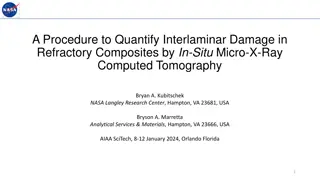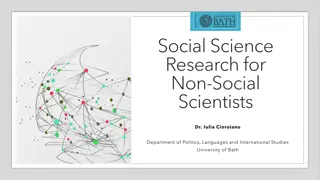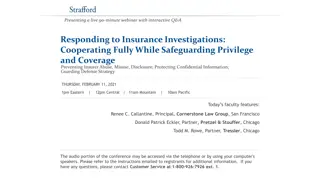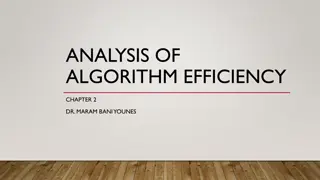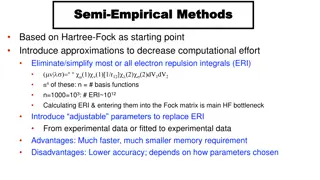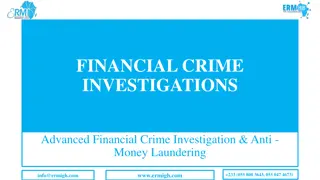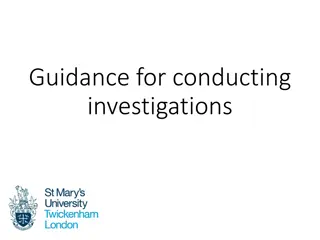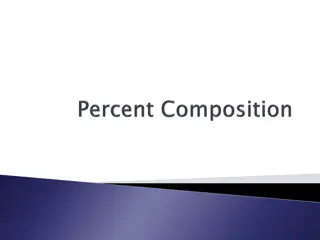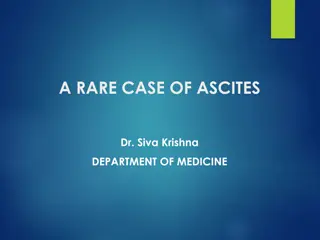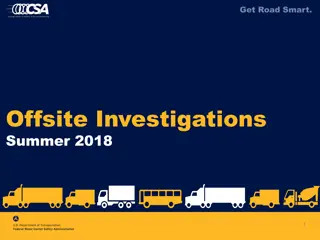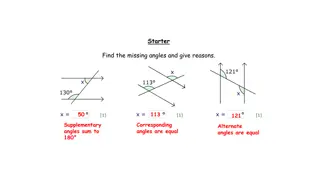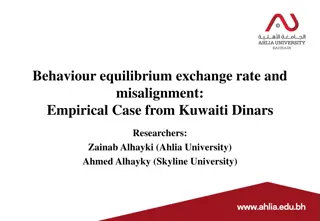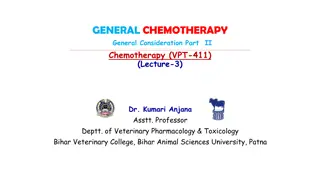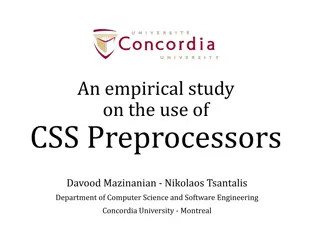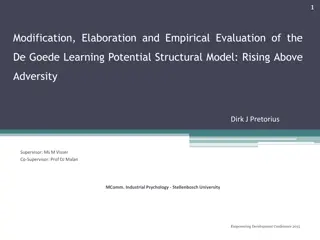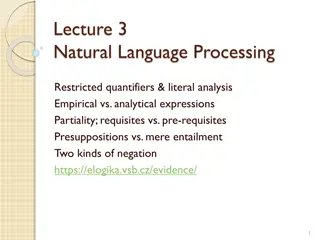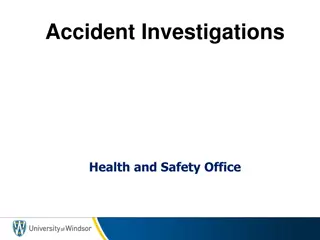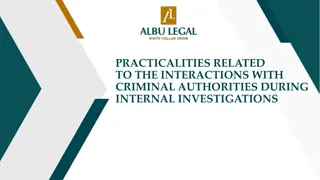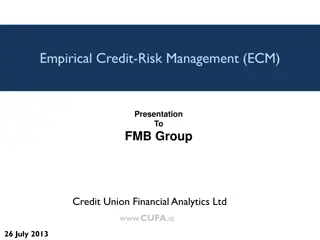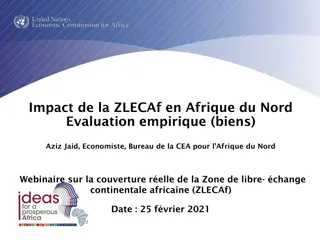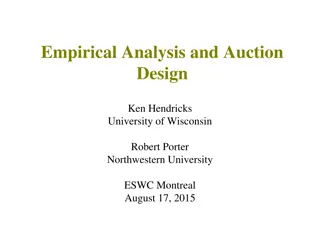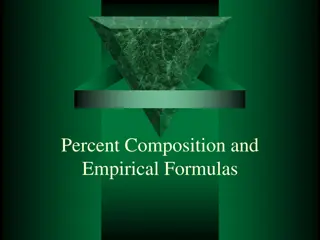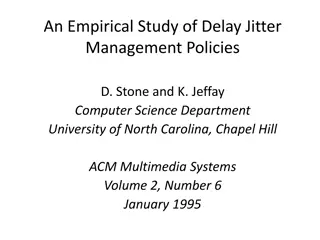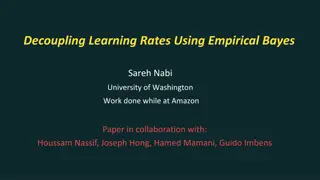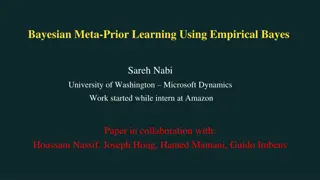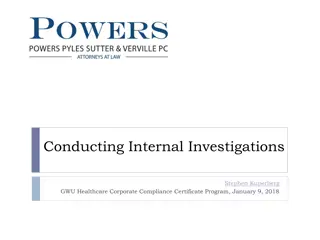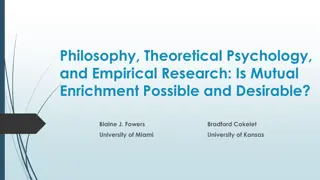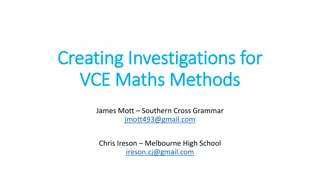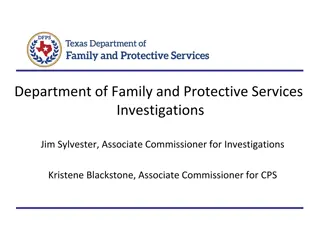Understanding Investigations in Science
Investigating in science involves various approaches beyond fair tests, such as pattern-seeking, exploring, and modeling. Not all scientists rely on fair tests, as observational methods are also commonly used. The scientific method consists of steps like stating the aim, observing, forming hypothese
1 views • 20 slides
Procedure for Quantifying Interlaminar Damage in Refractory Composites Using Micro-X-Ray CT
This study presents a method to quantify interlaminar damage in refractory composites through in-situ micro-X-ray computed tomography. The procedure aims to capture the progressive failure in ASTM-sized specimens, providing empirical data for improving simulations of composite materials. Various spe
6 views • 19 slides
Understanding Social Science Research for Non-Social Scientists at University of Bath
This resource delves into social science research fundamentals, encompassing types of inquiry, empirical research categories, primary and secondary research distinctions, and the importance of selecting a suitable research topic. It offers guidance on initiating research based on empirical observati
1 views • 10 slides
Insurance Investigations: Handling Privilege, Coverage, and Disclosure
Explore the nuances of responding to insurance investigations in this 90-minute interactive webinar. Learn how to cooperate effectively while protecting privilege, coverage, and confidential information. Gain valuable insights on preventing insurer abuse, misuse, and disclosure, as well as safeguard
0 views • 52 slides
Environmental Investigations Unit of Houston Police Department
Environmental Investigations Unit of the Houston Police Department is responsible for investigating crimes with environmental impact in the city, such as water pollution, hazardous waste dumping, air pollution, and illegal dumping. They work on large-scale investigations involving releases of hazard
0 views • 6 slides
Understanding Algorithm Efficiency Analysis
In this chapter, Dr. Maram Bani Younes delves into the analysis of algorithm efficiency, focusing on aspects such as order of growth, best case scenarios, and empirical analysis of time efficiency. The dimensions of generality, simplicity, time efficiency, and space efficiency are explored, with a d
1 views • 28 slides
Overview of Semi-Empirical Methods Based on Hartree-Fock
Semi-empirical methods derived from Hartree-Fock theory aim to reduce computational effort by approximating or eliminating electron repulsion integrals. Strategies include introducing adjustable parameters to replace ERI calculations and utilizing zero differential overlap methods like CNDO, INDO, N
1 views • 11 slides
Environmental Investigations Unit of Houston Police Department
The Environmental Investigations Unit of the Houston Police Department is responsible for investigating crimes with an environmental connection in the city. From water pollution to hazardous waste dumping, the unit handles a wide range of cases, focusing on criminal investigations and coordinating s
0 views • 6 slides
Parallel Implementation of Multivariate Empirical Mode Decomposition on GPU
Empirical Mode Decomposition (EMD) is a signal processing technique used for separating different oscillation modes in a time series signal. This paper explores the parallel implementation of Multivariate Empirical Mode Decomposition (MEMD) on GPU, discussing numerical steps, implementation details,
1 views • 15 slides
Child Placing Agencies and Child Caring Institutions Overview
Explore the procedures and protocols followed by Special Investigations and Regular Investigations units when dealing with allegations of maltreatment in Child Placing Agencies (CPA) and Child Caring Institutions (CCI). Learn about the different types of investigations and how cases are handled base
1 views • 16 slides
Advanced Financial Crime Investigations and Anti-Money Laundering Overview
Explore the world of advanced financial crime investigations, anti-money laundering, and the importance of estimating financial reporting errors. Delve into the role of internal audit and investigations, understand the significance of changes in accounting estimates, and learn why estimation is vita
0 views • 63 slides
Best Practices for Conducting Effective Investigations
Understanding the purpose, principles, and process of investigations is crucial for conducting fair and well-managed inquiries. Learn about the impact of improper investigations and follow a structured approach encompassing appointment of an investigating manager, defining scope, planning, evidence
0 views • 41 slides
Understanding Percent Composition and Empirical Formulas in Chemistry
The Law of Definite Proportions governs the composition of compounds based on molar masses, allowing us to calculate percentage compositions of elements within a compound. Through examples involving various compounds like Fe3C, sulfur dioxide, ammonium nitrate, glucose, and acetic acid, we explore t
3 views • 7 slides
A Rare Case of Ascites in a 22-Year-Old Female: Clinical Presentation and Investigations
A 22-year-old female presented with abdominal distension and pain. Her medical history, family history, and personal habits were reviewed. Examination revealed mild hepatomegaly and shifting dullness. Lab investigations showed normal values with no signs of infection. Ascitic fluid analysis indicate
1 views • 20 slides
Understanding Offsite Investigations in CSA's National Safety Interventions
Offsite Investigations are part of CSA's safety tools, conducted remotely to ensure carrier compliance. Safety Investigators review online documents to diagnose issues and provide corrective actions. Failure to comply may result in penalties or onsite investigations. Offsite Investigations have show
0 views • 7 slides
Geometry Investigations and Theorems
Explore various circle theorems and investigations involving angles, tangents, radii, and circumferences. Discover the relationships between angles at the center and circumference, the properties of tangents, and the angle measurements within a circle. Engage in investigations to understand the sign
6 views • 26 slides
Empirical Research on Surrogacy in New Zealand: Key Findings
Associate Professor Debra Wilson from the University of Canterbury in New Zealand conducted empirical research on public opinions regarding surrogacy. The findings revealed three surprising results, including perspectives on surrogates being compensated, the importance of genetics in surrogacy arran
0 views • 11 slides
Generalization of Empirical Risk Minimization in Stochastic Convex Optimization by Vitaly Feldman
This study delves into the generalization of Empirical Risk Minimization (ERM) in stochastic convex optimization, focusing on minimizing true objective functions while considering generalization errors. It explores the application of ERM in machine learning and statistics, particularly in supervised
0 views • 11 slides
Empirical Analysis of Kuwaiti Dinar Exchange Rate Behavior and Misalignment
This research focuses on studying the behavior of the real equilibrium exchange rate (REER) of Kuwaiti Dinars, estimating the equilibrium exchange rate using the BEER model, and calculating real exchange misalignments (RERM). It delves into the impact of exchange rate fluctuations on macroeconomic v
0 views • 15 slides
Rapid Investigation Service Overview
The Wessex RIS is a new cancer referral pathway aimed at patients with concerning non-specific symptoms. Working in partnership with acute trusts in Wessex, the service provides timely investigations to exclude cancer in such patients. Established as part of the National Rapid Diagnostic Centre proj
0 views • 15 slides
History of Chemotherapy: From Empirical Use to Modern Era
The history of chemotherapy is divided into three phases, starting from the empirical use of compounds in ancient times to the modern era marked by targeted drug development. Ehrlich's pioneering work in the late 19th to early 20th centuries laid the foundation for understanding the selective toxici
0 views • 15 slides
Empirical Study on CSS Preprocessors: Insights and Findings
Exploring the utilization of CSS preprocessors in web development through an empirical study conducted by Davood Mazinanian and Nikolaos Tsantalis from Concordia University. The study delves into the motivations behind using CSS preprocessors, developers' preferences, features offered by preprocesso
0 views • 24 slides
Empirical Evaluation of De Goede Learning Potential Model
This research paper focuses on the modification and extension of the De Goede Learning Potential Structural Model, aiming to identify non-cognitive variables influencing learning potential. Through model development, hypothesis testing, and empirical evaluation, the study explores factors such as In
0 views • 12 slides
Understanding Empirical vs Analytical Expressions in Natural Language Processing
Restricted quantifiers and literal analysis in natural language processing reveal the distinctions between empirical and analytical expressions. While empirical expressions refer to non-trivial intensions that require empirical investigation, analytical expressions denote constant intensions that ca
1 views • 19 slides
Effective Accident Investigations for Safety in the Workplace
Understanding the importance of accident investigations and their objectives is crucial for workplace safety. This content covers the definition of accidents, accident investigation objectives, the purpose behind investigations, and who typically conducts them. It emphasizes the need for thorough in
0 views • 34 slides
Practical Considerations for Interacting with Criminal Authorities During Internal Investigations
This content discusses the legal obligations and privacy issues involved when interacting with criminal authorities during internal investigations. It covers topics such as revealing information, privacy concerns with devices, documenting investigations, and standard procedures for requesting inform
0 views • 12 slides
Empirical Credit Risk Management at FMB Group Credit Union
Empirical Credit-Risk Management (ECM) presentation to FMB Group Credit Union by Financial Analytics Ltd discusses the background, traditional forecasting methods, income and risk recognition, provisioning approaches, and benefits for credit unions. ECM offers expert retail credit risk management th
0 views • 25 slides
Impact of ZLECAf in North Africa: Empirical Evaluation
The Economist, Aziz Jaid, from the CEA Bureau for North Africa conducted an empirical evaluation on the impact of the ZLECAf in North Africa, focusing on goods. The context includes coverage of seven countries, the rationale behind the ZLECAf agreement, and details on the liberalization scenarios an
0 views • 13 slides
Direct Payments & Social Care Investigations Workshop Overview
Explore the key areas covered in the Direct Payments & Social Care Investigations Workshop, focusing on Direct Payments, social care fraud, applications, counter-fraud work, investigations, and overcoming cultural resistance. Delve into the risks associated with social care fraud and learn about the
0 views • 28 slides
Understanding Auction Design: Empirical Analysis and Practical Insights
Auctions play a crucial role in various sectors due to their efficiency in price discovery and resource allocation. This article delves into auction design issues, the role of structural analysis, and the transformative Laffont program. Discover the importance of empirical analysis in optimizing auc
0 views • 59 slides
Understanding Percent Composition and Empirical Formulas
Explore the concept of percent composition, empirical formulas, and how to determine them through examples. Learn how to convert percentages to grams, calculate moles, and find the simplest ratio among elements in a compound.
0 views • 9 slides
An Empirical Study of Delay Jitter Management Policies
This study explores delay jitter management policies to support interactive audio over LANs, focusing on display queue management to minimize gaps in playout. The paper evaluates different queue management policies, including I-policy and E-policy, along with queue monitoring in the context of an em
0 views • 37 slides
Decoupling Learning Rates Using Empirical Bayes: Optimization Strategy
Decoupling learning rates through an Empirical Bayes approach to optimize model convergence: prioritizing first-order features over second-order features improves convergence speed and efficiency. A detailed study on the impact of observation rates on different feature orders and the benefits of seq
0 views • 25 slides
Bayesian Meta-Prior Learning Using Empirical Bayes: A Framework for Sequential Decision Making Under Uncertainty
Explore the innovative framework proposed by Sareh Nabi at the University of Washington for Bayesian meta-prior learning using empirical Bayes. The framework aims to optimize ad layout and classification problems efficiently by decoupling learning rates of model parameters. Learn about the Multi-Arm
0 views • 27 slides
Internal Investigations in Corporate Compliance
Understanding the importance of conducting internal investigations in corporate compliance is crucial to address potential misconduct, comply with regulations, and prevent legal implications. This article explores the reasons, methods, and benefits of internal investigations within organizations.
0 views • 33 slides
Internal Investigations in Corporate Compliance
An internal investigation in corporate compliance involves probing suspected misconduct within an organization. It is a crucial element of compliance programs, aimed at uncovering facts, halting violations, implementing remedies, and considering disciplinary actions or self-disclosure to authorities
0 views • 26 slides
The Interplay Between Theoretical Psychology and Empirical Research
Exploring the potential for collaboration between philosophy, theoretical psychology, and empirical research, this article delves into the historical divide, recent renaissance, and avenues for mutual enrichment. It raises questions about how each discipline can contribute to and benefit from the ot
0 views • 16 slides
Strategies for Creating Mathematical Investigations with CAS Technology
In this workshop, participants will learn strategies for developing structured and open-ended mathematical investigations with the support of CAS (Computer Algebra System) technology. The session will focus on breaking down big ideas into components, drafting tasks effectively, creating open-ended q
0 views • 12 slides
Overview of Department of Family and Protective Services Investigations
The Department of Family and Protective Services (DFPS) Investigations Division was established in 2017 as part of DFPS becoming an independent agency. The division incorporates investigative functions from various departments to focus on ensuring the safety, permanency, and well-being of children a
0 views • 16 slides
Walk Through Series 1: Expectations & Investigations for Title IX Team Members
This walk-through series provides guidance for advisors on their roles, responsibilities, and expectations when supporting students, faculty, and staff involved in Title IX investigations. It covers important topics such as advisor violations, maintaining privacy, intake meetings, investigations, an
0 views • 9 slides

